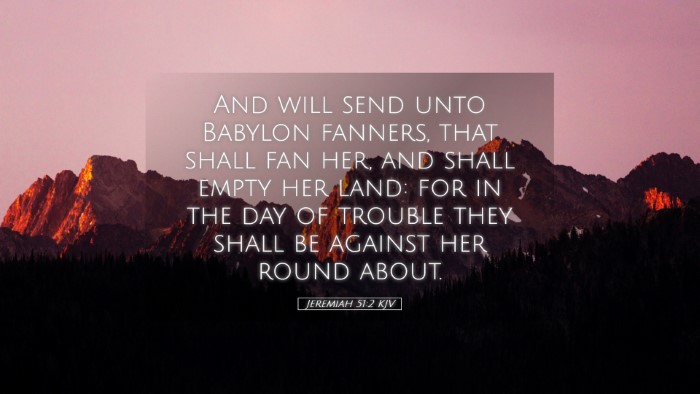Commentary on Jeremiah 51:2
Jeremiah 51:2 states: "And will send unto Babylon fanners, that shall fan her, and shall empty her land: for in the day of trouble they shall be against her round about."
Introduction
This verse is situated within a larger prophetic context concerning the judgment and impending doom of Babylon, a symbol of human pride and opposition to God. Commentaries from respected theologians shed light on its meaning, reflecting the themes of divine judgment, the sovereignty of God, and the ultimate hope for His people.
Contextual Background
Babylon, the heart of a vast empire, represented sin and idolatry. The prior chapters lead into Jeremiah 51, establishing the motivation behind God’s impending judgments. To understand this verse fully, it is essential to grasp the socio-political implications of the time and God’s desire for justice.
Insights from Matthew Henry
Matthew Henry highlights that God employs "fanners" to cleanse Babylon much like one would sift wheat. The imagery suggests a vigorous action where the "fanners" represent forces that would be used to bring destruction, effectively taking away the worthless chaff and leaving behind the significant.
Henry explains that this divine intervention is necessary on the day of her trouble, indicating that even though the wicked seem fortified, God’s timing will bring them to a point of reckoning. This serves as a reminder of God’s omnipotence and reminds believers that He actively governs the affairs of nations.
Insights from Albert Barnes
Albert Barnes emphasizes the "fanning" process as a divine judgment mechanism. He elaborates that the fanners are representative of God’s agents, both natural and supernatural, who will enact punishment upon Babylon. The surrounding nations, which may seem innocuous, will become instruments of God’s wrath.
- Purpose of Fanning: To "empty" the land signifies a total desolation—a complete turning away of the land’s prosperity. This highlights God's sovereignty in determining the fate of nations.
- The Day of Trouble: Barnes posits that this refers to a specific period of catastrophic judgment, which demonstrates the certainty of God’s word. The phrase implies that judgment is not arbitrary but follows a divine schedule.
Insights from Adam Clarke
Adam Clarke approaches this passage with an analytical perspective, interpreting the fanners as instruments of war. He suggests that the term implies an act of sifting or separation, where the righteous will be distinguished from the wicked.
Clarke notes the severity of judgment indicated by "shall empty her land," which aligns with God's promise to hold nations accountable for their actions. Furthermore, he identifies the "day of trouble" as a time when those who once thought themselves secure will face overwhelming desolation.
Theological Reflections
This verse serves as a powerful reminder of God's judgment on sin. The imagery of fanning and emptying speaks profoundly to the belief that God not only sees the injustice in the world but acts decisively against it.
- Divine Justice: There are tangible consequences for nation’s actions, a theme echoed throughout scripture. The judgment pronounced on Babylon speaks to God's faithfulness to uphold justice, reassuring believers of His control over chaotic worldly systems.
- Instrumental Use of Nations: The surrounding nations are not merely passive observers in this narrative. They are tools in the hands of God, highlighting His providential governance over history.
Practical Implications for Believers
For pastors, students, and theologians, Jeremiah 51:2 provides essential insights into God's character—where justice is paramount, and His faithfulness is unwavering. The implications for modern-day believers are profound:
- Hope Amidst Judgment: Just as God judged Babylon, the ultimate hope lies in His promise of restoration for His people.
- Call to Righteousness: This passage serves as a challenge for individuals and congregations to remain steadfast in moral integrity, knowing that God is aware of the deeds done in darkness.
- Encouragement to Preach Justice: Pastors are called to articulate both the warning of impending judgment and the profound mercy offered through Christ, urging congregations to seek righteousness.
Conclusion
Jeremiah 51:2 encapsulates a moment of divine severity against a proud and defiant empire. Insights from revered commentators illuminate its depths, encouraging a deeper understanding of God’s unyielding justice. As believers reflect on this passage, they are reminded of both the seriousness of taking a stand against sin and the ultimate victory that God holds over it. The study and proclamation of these truths remain vital for effective teaching and the encouragement of righteous living among believers.


